Our European Vacation: The Limousin Region and Oradour-sur-Glane
As an Amazon Associate I earn from qualifying purchases. For more details, please see our disclosure policy.
This fall we spent a month abroad where we visited London, Paris, and a handful of cities in Western France. We explored, rested, and learned a ton about ourselves and the world. This is the sixth installment of our European adventure. If you missed it, go to the beginning here.
When we left off on the European Vacation saga, the rain was chasing us away from Leonardo da Vinci’s last home, the Chateau de Clos Luce. Recently our family watched the film Ever After which is set in the Loire and features da Vinci. It made me a little sad that we didn’t spend more time in the Loire.
But, when you spend a month traveling the entire length of a country and you’re pretty worn out at the start of it (from life in general), you have to move quickly. No dawdling.
Our next stop was Poitiers where I had spent about six weeks as a college student when I first arrived in France. In the rain and the dark, it was hard to recognize anything.
We stayed at the Hotel Come Inn (yes, really) which is located near the main roads for easy access. FishPapa and I dodged the raindrops to checked in at the hotel. By this time, my French was warming up a bit; the clerk even said my French was good. Amen. Hallelujah.
Once we got our room keys and checked that everything was in order: two rooms: one to suit five people (the guys) and one to suit three people (the girls), we went in search of dinner.
FishPapa wanted to redeem our disastrous pizza experience in Le Mans. The hotel clerk gave us directions to an Italian place not too far away. Raining. Wrong turns. My fault. Nun said.
It had been such a hard day for me. For some reason I couldn’t even get the door to open to Baila Pizza when we finally found it. I even started to walk away, though we could see the dining room full of people. Yikes!
The pizza lady welcomed us in and we were fed. The day of mistakes was washed away in a glass of red wine, HUGE pizzas, and candy for the kids. Our day was redeemed.
The next day put a lot of things into perspective.
Oradour-sur-Glane
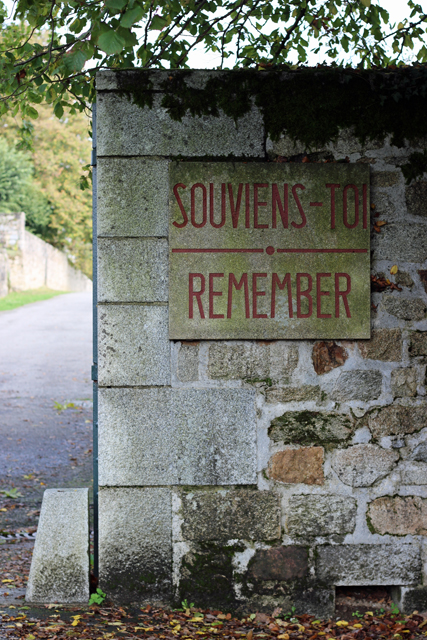
Want to save this post?
Enter your email below and get it sent straight to your inbox. Plus, I’ll send you time- and money-saving tips every week!
I am not sure how FishPapa heard about Oradour-sur-Glane; I had never heard this ghost village mentioned during my year in France, even though I lived in Poitiers not too far away.
Oradour-sur-Glane was a small village whose inhabitants — 642 men, women, and children — were massacred by the Nazis just days after D-Day. What is left of the village stands in memorium of those who were murdered. It is very moving and sobering to walk through the ruins.
If you don’t know the story, I highly recommend your reading it. Be prepared for horrific things, though.
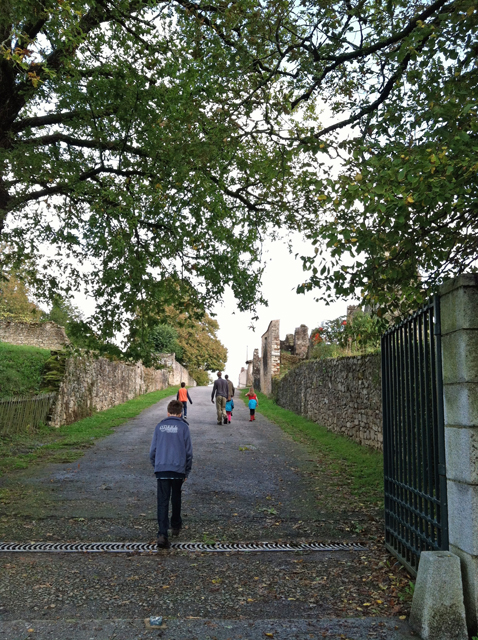
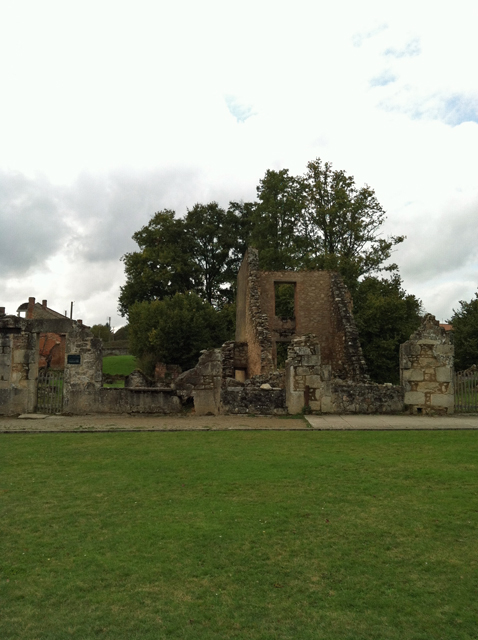
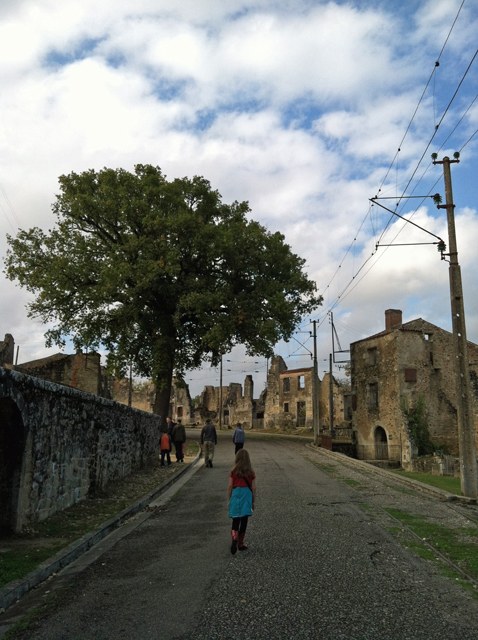
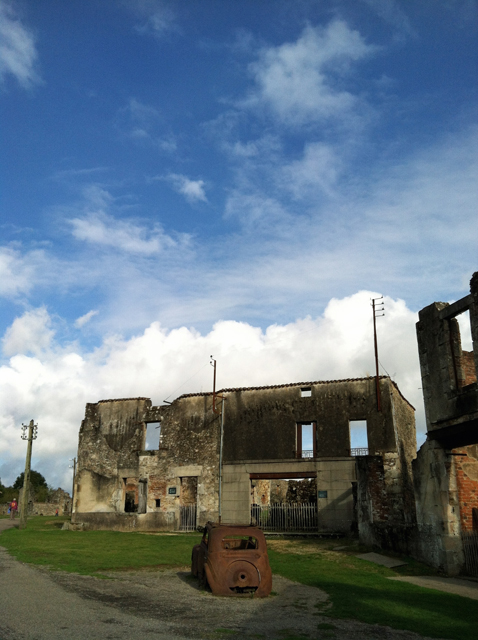
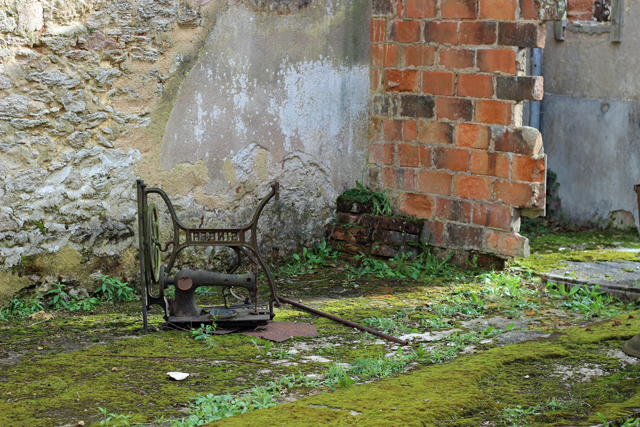
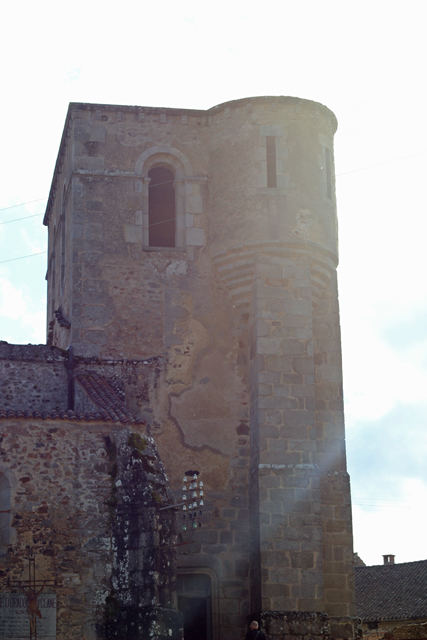
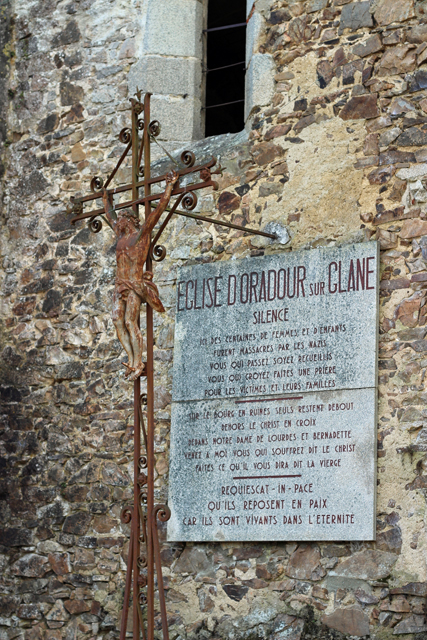
Near the ruins stands the new Oradour-sur-Glane
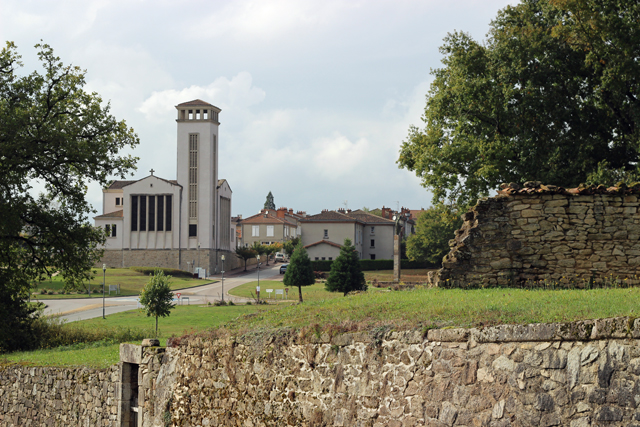
as well as a Memorial Center.
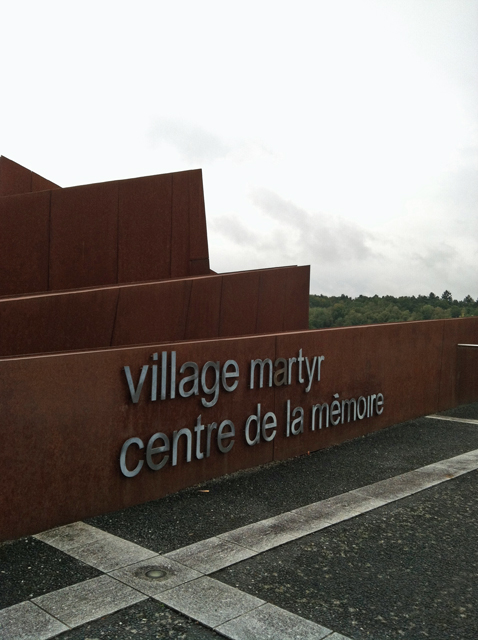
I was a French major. I lived a year in France. Yet, I knew nothing of this village and the atrocities its people suffered before my husband stumbled on it on a travel site.
Before our trip, I kinda thought the French were cowards for giving in “so easily” to the Germans. I thought that the Germans were a cowardly people for allowing Hitler to do what he did. I learned different.
In the visitor’s center there are extensive displays to explain the history of the village, of Nazism, of the French Resistance, and of the German Resistance. German Resistance? Yes, there were German people who fought back. I didn’t know that.
Despite my master’s degree, I was pretty clueless about the horrors of WW2. I still am, to some extent. But, my eyes got open on our visit to Oradour. I learned a little more of the atrocities that Hitler brought to France, a little more of the evil that threatened to take over our world.
Our road trip through France started on the shores of D-Day became a little more poignant at Oradour-sur-Glane to see in what all that fighting was for.
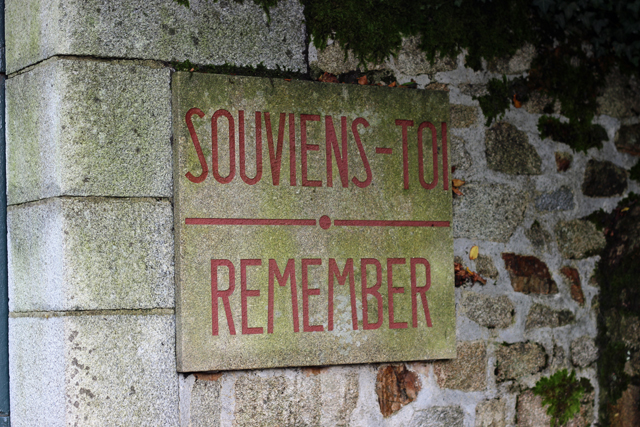
A note about the visitor’s center: Unless your whole party speaks and reads French, you will want to spring for the English audio guides. My children 10 and over were able to pay good attention to the exhibits, though it was a little sketchy for the younger kids.
The information is pretty graphic — how could it not be? — but we felt that it was important for our family to learn about this important event in history.

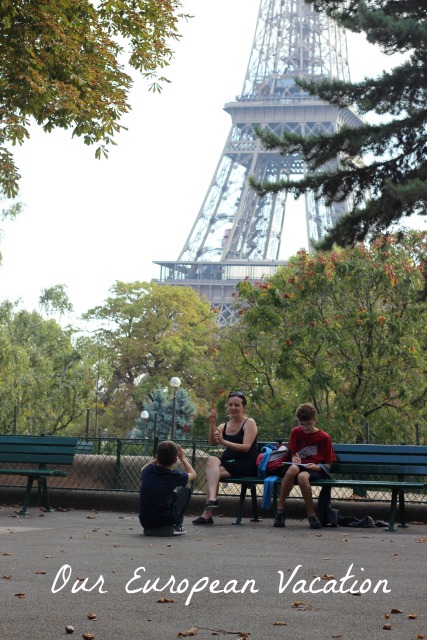
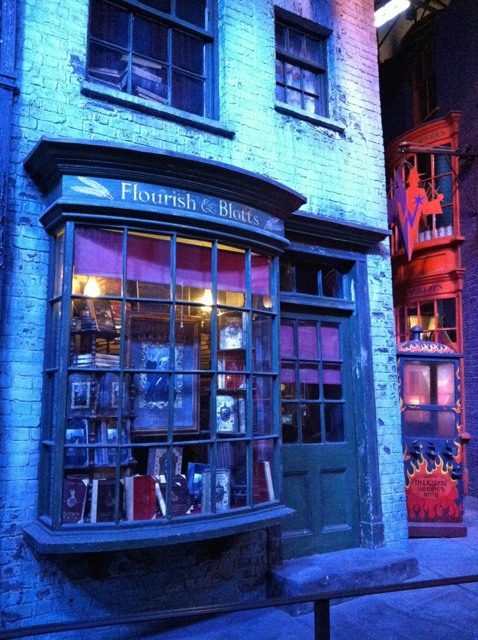
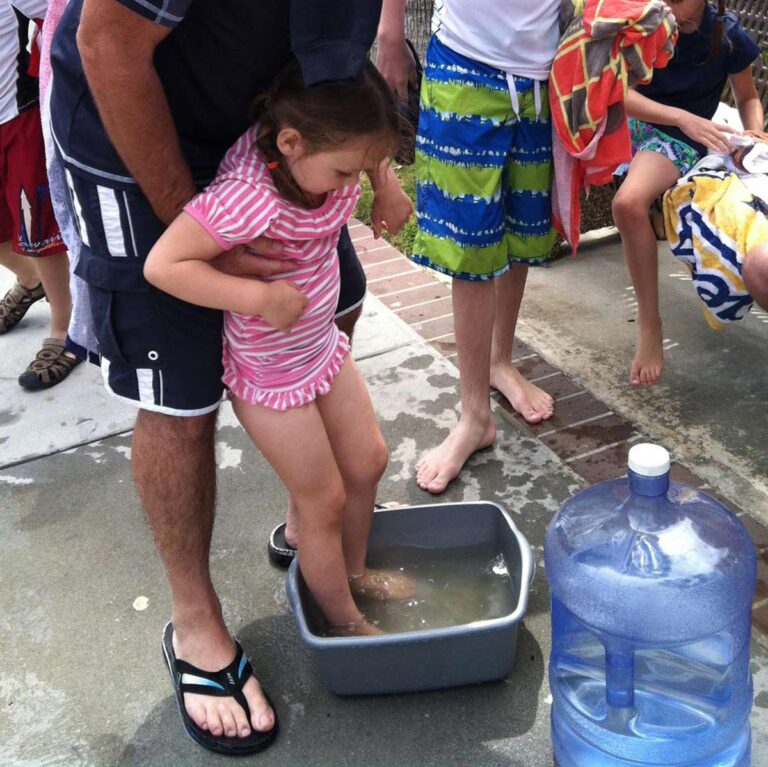

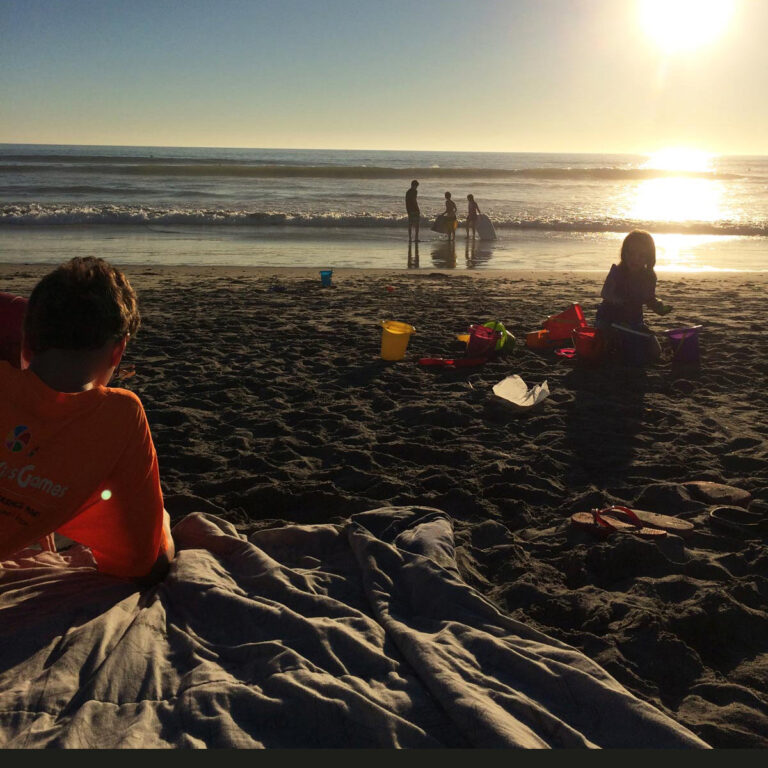
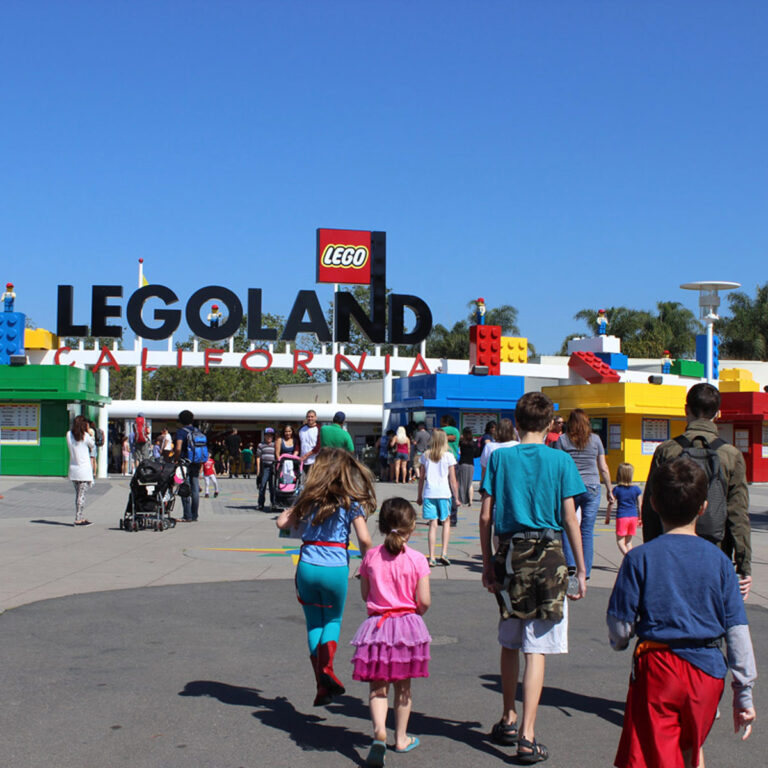

Do you know of any good books about Oradour-sur-Glane?
This day of your trip sounds like one you will never forget. Thanks for sharing!
I don’t. We read it on Wiki before we went and then read lots of stuff in the exhibit.
Love this little glimpse of your trip. We did a 3-week European trip with our girls to Germany and Luxembourg in 2002. They were 8 and 5. We are all ready to go back (they’re 21 and 18 now). So much rich history there.
I’m reading All the Light We Can Not See by Anthony Doehrr. A beautifully written story about the WWII occupation in France. I bet you’d enjoy it. I’m about 2/3 of the way through it and really enjoying it.
It’s on my list! Thanks for the nudge.
I have been enjoying your posts on your trip. Would love some perspective on how you helped prep your kids for the reality of being gone from home so long. After a 3 day trip to grandparents house my kids are kissing the walls of our home when they return. Any tips for helping kids prep for the longer term travel mindset would be appreciated as we hoping to do something similar in a few years.
You know, we didn’t really. That is probably why Paris the first time was so hard; they’d hit the wall. But, having familiar games and eating occasional (gross) American fast food, they were okay. When we had good meals (not McD), my kids were really happy and content. Foodie kids, what? They all loved London (where we ate the best) and can’t wait to go back.
My father was in the Army in the 70’s, we were stationed in a small village in northern Germany. The Germans were so nice to us. They hadn’t seen any Americans since the war, but they were still grateful to have us there. My brother and I took a field trip to Berlin with our class. We stood at the wall and watched the Russian soldiers march back and forth. I had never heard of the cold war before this, but after I knew what it meant. It taught me to never take freedom for granted.
What great experiences for you!
I would love to go one day with family. Expensive.
It was not cheap, but now that we’ve done it before, I see ways to make it less expensive. As it was we were $5K under budget.
All across Europe the rise of anti-Jewish sentiment is taking hold once again. Have we learned from the past? And I wonder how many are paying attention as our world is being changed and the desire for world dominance is once again rising among radical Islamic terrorist groups. France looked the other way and today find themselves in a very difficult place. Never take the word of a commentor on a blog. If we are not going to relive the atrocities of the recent past, it behooves us to KNOW what is happening around us. WE owe it to our children.
If you have never read Shining Through by Susan Isaacs, I highly recommend it. Though fiction, the historic detail is amazing. http://www.amazon.com/s/ref=nb_sb_ss_c_0_22?url=search-alias%3Dstripbooks&field-keywords=shining+through+susan+isaacs&sprefix=shining+through+susan+%2Caps%2C253
Sarah:
You must be so proud of your great grandmother! She risked her life – and those of her children’s – because of her work in the Resistance. Because of people like her, there was hope in the years of darkness. If everyone could have been like your great grandmother, who knows how many more lives could have been saved? I am so sorry the war greatly shortened her life; may her memory be an inspiration to all of us.
So fun to follow your trip. And yes, the German resistance was definitely there. My great grandmother worked in the German resistance. As a German woman in a German settlement in Poland she was allowed to have a radio when others were not, so the Polish resistance snuck into her house at night to listen to the news and hear updates from Britain. She sent her five children with messages or supplies to others, buried under dirt in flower pots and disguised as gifts of plants. Before they had any idea that they were heading to death camps, her Jewish friends and neighbors would bring her valuables to hide under her floorboards until they returned, sometimes throwing them up to her windows from passing trucks carting them away. She was a well known cook in her village, so when Germany invaded Poland they forced her to cook for the officers as a fellow German. She would overcharge “so she could buy special groceries for them with the high costs”, then use the extra money to help the resistance. From her legacy, I learned that even small acts of defiance are meaningful – she used to make sure she was always carrying one of her small children so that she did not have to salute the Nazi flag. Eventually, when the Russians invaded the rest of her family was able to flee, but the Russians placed her and her youngest child in a concentration camp of their own (the Russians were certainly no better than the Nazis in their practices, and horrific in their treatment of women in the territories their soldiers crossed). She died very shortly after her release at the end of the war. My grandfather also grew up in a German settlement in Eastern Europe. His parents hated the Nazis (as did most in the village) but they were required to allow their children to attend Hitler Youth on pain of death. He tells me they did not learn much Nazi lore, but mainly how to survive if their region was invaded or bombed (both happened – as a young boy he got his grandmother, aunt, and cousins out alive, but many of them eventually died while fleeing). I treasure my grandparents legacy, both the good and “honorable” parts, and the sad and horrifying parts of Nazism’s rise in Germany and the horrors perpetrated in its name. I’d never heard of this village in France, though I’ve read a fair amount about the resistance. The classic movie “The Train” starring Burt Lancaster is a good one to watch with your older teens about the French resistance.
Wow! What a wonderful heritage you have. Thank you for sharing this beautiful story.
Thanks for sharing.
Wow! What a rich heritage you have. Thank you for sharing.